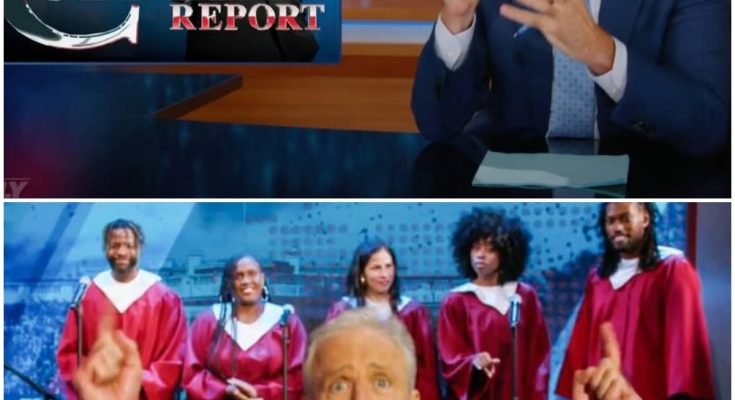It was the kind of Monday night that late-night television was made for—a night when the news wasn’t just reported, but made. The headlines were everywhere: CBS had canceled “The Late Show With Stephen Colbert.” For millions, it felt like the end of an era, the silencing of one of the sharpest, kindest, and most beloved voices in American comedy.
But if CBS thought the story would end quietly, they had underestimated the power of friendship, satire, and a gospel choir with a message no one would soon forget.
On “The Daily Show,” Jon Stewart—Colbert’s longtime friend, mentor, and comedic partner-in-crime—delivered a response that was as fiery as it was unforgettable. By the time the credits rolled, Stewart had led his audience, backed by a full gospel choir, in a raucous, cathartic, and unfiltered sing-along: “Go f–k yourself!”
The moment instantly went viral, sparking laughter, debate, and a cultural reckoning about the state of late-night TV, the power of satire, and what happens when the people who make us laugh refuse to go quietly.
The Shock Heard ‘Round the World
The news broke early Monday morning. After years at the helm of “The Late Show,” Stephen Colbert was out. CBS, citing “creative differences” and “changing audience priorities,” had pulled the plug. The announcement was met with disbelief, outrage, and a tidal wave of support for Colbert from fans, celebrities, and fellow comedians.
Colbert, known for his razor wit and unflinching honesty, had become a nightly companion for millions. His monologues, interviews, and moments of genuine empathy had helped Americans laugh through some of the most turbulent years in recent history. To see him unceremoniously axed felt, to many, like a betrayal—not just of Colbert, but of the values he represented.
The late-night world was in shock. But no one was more ready to respond than Jon Stewart.
Jon Stewart: The Elder Statesman of Satire
For years, Stewart and Colbert had been the twin pillars of smart, subversive political comedy. Stewart, as host of “The Daily Show,” had mentored Colbert, first as a correspondent and later as the star of “The Colbert Report.” Their friendship was legendary, their comedic chemistry unmatched.
Stewart had returned to “The Daily Show” in recent years, bringing with him the same blend of righteous anger, quick wit, and deep compassion that had made him a cultural icon. If anyone was going to speak truth to power—and to CBS—it was Stewart.
Monday Night: The Gloves Come Off
From the opening moments of Monday’s episode, it was clear that Stewart was on a mission. He addressed the camera with a mix of disbelief and fury.
“CBS, what the hell are you thinking?” he began, his voice equal parts incredulous and mocking. “You cancel Stephen Colbert? The guy who made your network relevant again? The guy who helped America survive the Trump years without setting ourselves on fire?”
The audience roared. Stewart wasn’t just angry—he was hurt, and so was everyone watching.
He recounted Colbert’s legacy: the fearless satire, the moments of vulnerability, the way he made politics feel personal and urgent. Stewart reminded viewers that Colbert had weathered scandals, political attacks, and even a global pandemic—always with grace, humor, and a deep sense of humanity.
“And now,” Stewart continued, “you kick him to the curb? For what? Another game show? A reboot of ‘CSI: Boise’?”
The jokes landed, but beneath the laughter was a real sense of loss.
The Gospel Choir: Turning Outrage Into Anthem
But Stewart wasn’t finished. “You know,” he said, “sometimes words aren’t enough. Sometimes, you need music. You need a choir.”
With that, the studio doors swung open, and a full gospel choir—robes, harmonies, and all—marched onto the stage. The audience erupted in cheers.
Stewart, grinning mischievously, turned to the choir. “Ladies and gentlemen, tonight we sing not just for Stephen Colbert, but for every voice that’s ever been silenced by the powers that be. Let’s raise our voices and send a message.”
He raised his baton. The choir began, softly at first, then building to a jubilant crescendo:
“Go f–k yourself! Go f–k yourself!”
The audience joined in, clapping, laughing, some with tears streaming down their faces. It was cathartic, defiant, and utterly unforgettable.
A Viral Sensation: America Sings Along
Within minutes, the clip was everywhere—Twitter, TikTok, YouTube, even the evening news. “Jon Stewart’s Gospel Choir Sing-Along” trended worldwide. Memes, remixes, and reaction videos flooded social media. Celebrities chimed in, with everyone from Lin-Manuel Miranda to Samantha Bee posting their own versions of the song.
For many, the moment was more than just a joke. It was a rallying cry—a way to channel frustration, sadness, and anger into something joyous and communal. In a divided country, Stewart had given people a way to come together, if only for a few minutes, and laugh in the face of absurdity.
Satire as Resistance: Why Late Night Still Matters
The episode was a reminder of why late-night TV, at its best, is more than just entertainment. It’s a space where comedians can speak truth to power, challenge authority, and help audiences process the madness of the world.
Stewart’s sing-along wasn’t just about Colbert. It was about all the ways institutions fail the people they’re supposed to serve. It was about the importance of dissent, the power of laughter, and the refusal to let cynicism win.
As Stewart told his audience, “Comedy is how we survive. It’s how we fight back. And sometimes, it’s how we say the things that need to be said—loud, proud, and in four-part harmony.”
Stephen Colbert: Grace Under Pressure
Colbert himself responded with characteristic wit and humility. In a statement posted to social media, he thanked Stewart, the choir, and his fans.
“If you’re going to get fired,” he wrote, “it helps to have a friend with a gospel choir and a good sense of rhythm. Thank you, Jon. Thank you, America. I’ll see you soon—somewhere.”
His words were met with an outpouring of support. Fans shared their favorite Colbert moments, from his legendary interviews to his heartfelt tributes to his family and staff. For many, Colbert’s exit was bittersweet—but Stewart’s response had turned pain into power.
CBS: The Backlash Builds
CBS, meanwhile, found itself at the center of a firestorm. Critics slammed the network for its decision, pointing to Colbert’s ratings, influence, and cultural significance. Petitions circulated, demanding his reinstatement. Advertisers reportedly expressed concern about the backlash.
Network executives issued a bland statement about “moving in a new direction,” but the damage was done. In the court of public opinion, CBS had lost—and Stewart, Colbert, and the gospel choir had won.
The Power of Friendship and Comedy
At its core, the night was about more than television. It was about friendship—the kind that endures through triumph and disaster, that lifts us up when we fall, that reminds us of who we are.
Stewart and Colbert’s bond, forged over decades of collaboration and mutual respect, was on full display. In a world that often feels cold and transactional, their loyalty was a beacon.
As Stewart said in his closing remarks, “They can cancel a show, but they can’t cancel the truth. They can’t cancel love. And they sure as hell can’t cancel the choir.”
A Legacy of Laughter
What happens next is anyone’s guess. Maybe Colbert will land at another network. Maybe he’ll start his own show, podcast, or streaming platform. Maybe he’ll take a well-deserved break and return stronger than ever.
But whatever the future holds, one thing is certain: the legacy of Colbert, Stewart, and the gospel choir will live on. Their defiance, their humor, and their willingness to sing truth to power—literally—will inspire comedians, fans, and truth-tellers for years to come.
Conclusion: When the Choir Sings, We All Listen
In a world where bad news comes fast and hope can feel in short supply, sometimes all we need is a song—a reminder that we’re not alone, that laughter is a weapon, and that the people who make us laugh are worth fighting for.
On Monday night, Jon Stewart and his gospel choir didn’t just respond to a cancellation. They started a movement. And somewhere, Stephen Colbert was smiling, knowing that the show—like the song—must go on.



